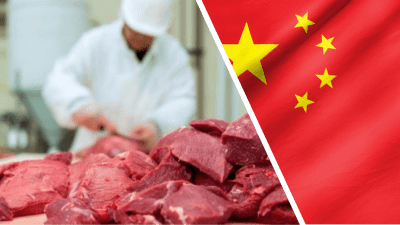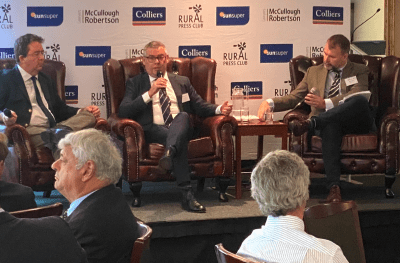How Australia has handled its relationship with China and the collateral damage to trade that has ensued is again in the spotlight after the cancellation of a 10th Australian abattoir’s export license by Chinese authorities last week.
 The delisting of Teys’ Naracoorte plant is the latest development in a near two-year long trade spat that has seen China block a wide range of exports from Australia to its market, which has also included barley, coal, copper ore, sugar, wine, seafood and timber.
The delisting of Teys’ Naracoorte plant is the latest development in a near two-year long trade spat that has seen China block a wide range of exports from Australia to its market, which has also included barley, coal, copper ore, sugar, wine, seafood and timber.
The suspension of a 10th Australian export plant by China last week has prompted the Australian Meat Industry Council to call for the Australian Government to work on re-opening its dialogue with China.
“All we’re really looking for is that the dialogue between Government bureaucrat to Government bureaucrat is more open and more free so that information flow can increase on issues, and that we have that two way discussion,” AMIC CEO Patrick Hutchinson told Kerry Lonergan in the opening Weekly Grill interview of 2022.
“Currently at the moment we don’t have that.”
Two Australian senators on either side of the mainstream political divide spoke at a Queensland Rural Press Club corporate sponsors lunch late last week, and were asked whether they believed the Morrison Government has handled its relationship with China appropriately.
Economic war
In response Liberal Senator for Queensland James McGrath strongly defended the Government’s position, stating that China has effectively declared “economic war” on Australia and was seeking to bully smaller nations.
“Australia must make a decision as to whether we – bearing in mind that our trading relationship is an important relationship for many industries as well -but when you’re dealing with a bully, and communist China is a bully, just look at Hong Kong, just look at the Uighurs, you have to draw a line in the sand somewhere,” he said.
Senator McGrath, who has previously worked as a political advisor to then London Mayor and now British PM Boris Johnson, added that he still has strong connections within the British Conservative Party, and said it was interesting to note “how scared some of the rest of the world is about how Australia has been treated”.
“Not because of anything the Government has done or not done, but it is the behaviour of China.”
He said Australia and China could still both benefit from a trading relationship, which was important, but Australia also had to stand firm on its values as a liberal democracy.
“There may be some conflict between those two elements, but we’ve got to take this relationship seriously especially considering what is happening at Ukraine and look at the broader impact of what China are up to at the moment.”
Senator McGrath added that the COVID era has demonstrated the importance of having a diversity of markets and not becoming reliant on any one customer.

Senators James McGrath (left) and Murray Watt (centre) during a panel session moderated by Sean Parnell (right) at a Queensland Rural Press Club corporate lunch in Brisbane last week.
War-like language not helpful
Australia Labor Party Senator for Queensland Murray Watt said the Australian Government has mishandled its relationship with China, and said the Federal Government’s use of “war-like language” was not helpful.
“I think that is done for domestic political consumption, particularly to try address the Government’s problems on the Australian political right, but there is a consequence there for Australia in over-egging these issues through that kind of language,” he said.
“What you can expect from Labor as I said earlier is we stand up for the national interest, we always stick up for our national values, but we don’t do it in a way that is for domestic political gain.
“And if you look around the world there are many other countries that have been able to manage these issues with China much more successfully.
“Japan, South Korea, they have had tensions with China for decades, they have fundamental differences of values and beliefs, but they have been able to handle those in a way without trashing their economic relationships, and that is the way we think is the way forward.”
Asked by moderator, Brisbane Times editor Sean Parnell, if he agreed that the Government has been “over-egging” the situation with China, Senator McGrath said he stood by the description of China’s recent actions as an “economic war”.
Holding up his mobile phone, he said he could no longer receive emails through Microsoft Outlook because the Australian Parliament had been the focus of numerous attempted hacks by “an unknown State actor”.
“Now, war is quite an emotive term, but in terms of it being an economic war, I stand by that,” he said.
“In terms of the fronts being opened up on the wine industry, the barley, the meat industry, the barley, well, what would you call it otherwise?
“They have hurt our primary producers and it is part of the punishment for perceived misgivings about us calling out that country in relation to what happened in the origins of Coronavirus, and that is part of us being a liberal democracy believing in freedom of speech, so I stand by it.”
